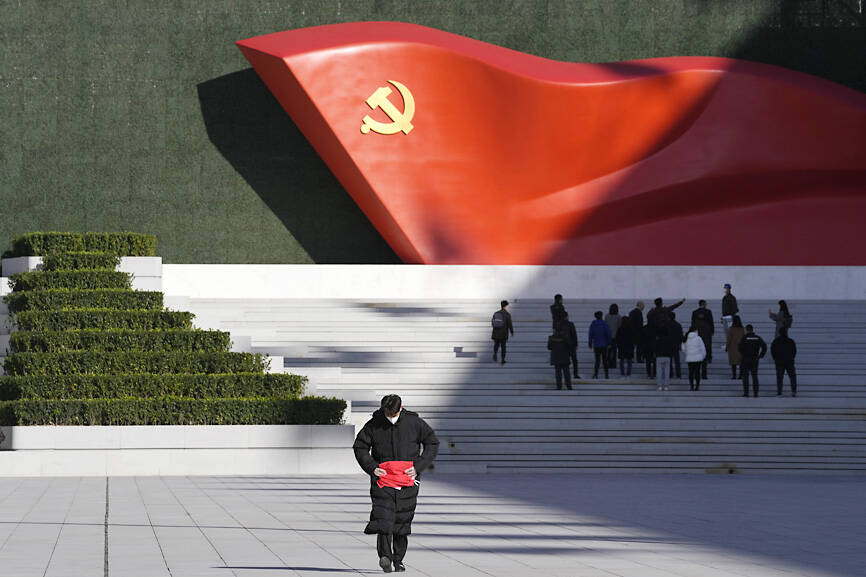China’s Fujian Province on Monday began implementing 15 economic measures targeting Taiwanese in its latest bid to fan pro-Beijing sentiment ahead of the Jan. 13 elections.
Chinese state-run Xinhua news agency said the policies were part of “21 measures” unveiled in September by China for Fujian’s “integrated cross-strait development demonstration zone.”
The partially implemented measures, which were created with input from Beijing, include reducing the wait time for Taiwanese applying for a visa from 20 days to five days and free public transit for Taiwanese older than 65, it said.

Photo: AP
Residents of Taiwan were granted use of the “all provincial Taiwanese entrepreneur compatriot financial and credit certification online management platform,” Xinhua said.
Agricultural loans for Taiwanese farmers were enhanced, while a patent scheme was established for businesses based in Kinmen or Lienchiang counties, or otherwise registered in China’s Fujian province, it said.
The measures also included rent waivers and housing subsidies for start-ups, with 2,000 housing units supposedly being offered at prioritized locations, with expanded recognition of Taiwanese professional certificates, it said.
A program was created to support 100 collaborative projects between Taiwanese and Chinese by furnishing subsidies to architects and creative industries, with three template counties, 13 template townships and 13 template villages to receive money starting next year, it said.
The measures also include the creation of a Taiwan-China maritime dispute resolution center in the province, it added.
Previously, the Mainland Affairs Council described the measures as part of an “integration plan” for annexing Taiwan that was created by the Chinese Communist Party’s 20th National Congress.
The policies were an expression of China’s “wishful thinking” that it could lure Taiwanese and Taiwanese businesses into placing themselves under China’s legal and institutional control, which ultimately means accepting communist rule, the council said.
Beijing’s ability to make good on the economic promises of the 21 measures are questionable in light of China’s economic doldrums, including a collapsing housing market, youth unemployment, weak consumer spending and systemic risks in its financial sector, it said.

Taiwan has received more than US$70 million in royalties as of the end of last year from developing the F-16V jet as countries worldwide purchase or upgrade to this popular model, government and military officials said on Saturday. Taiwan funded the development of the F-16V jet and ended up the sole investor as other countries withdrew from the program. Now the F-16V is increasingly popular and countries must pay Taiwan a percentage in royalties when they purchase new F-16V aircraft or upgrade older F-16 models. The next five years are expected to be the peak for these royalties, with Taiwan potentially earning

STAY IN YOUR LANE: As the US and Israel attack Iran, the ministry has warned China not to overstep by including Taiwanese citizens in its evacuation orders The Ministry of Foreign Affairs (MOFA) yesterday rebuked a statement by China’s embassy in Israel that it would evacuate Taiwanese holders of Chinese travel documents from Israel amid the latter’s escalating conflict with Iran. Tensions have risen across the Middle East in the wake of US and Israeli airstrikes on Iran beginning Saturday. China subsequently issued an evacuation notice for its citizens. In a news release, the Chinese embassy in Israel said holders of “Taiwan compatriot permits (台胞證)” issued to Taiwanese nationals by Chinese authorities for travel to China — could register for evacuation to Egypt. In Taipei, the ministry yesterday said Taiwan

‘LIKE-MINDED PARTNER’: Tako van Popta said it would be inappropriate to delay signing the deal with Taiwan because of China, adding he would promote the issue Canadian senators have stressed Taiwan’s importance for international trade and expressed enthusiasm for ensuring the Taiwan-Canada trade cooperation framework agreement is implemented this year. Representative to Canada Harry Tseng (曾厚仁) in an interview with the Central News Agency (CNA) said he was increasingly uneasy about Ottawa’s delays in signing the agreement, especially as Ottawa has warmed toward Beijing. There are “no negotiations left. Not only [is it] initialed, we have three versions of the text ready: English, French and Mandarin,” Tseng said. “That tells you how close we are to the final signature.” Tseng said that he hoped Canadian Prime Minister Mark Carney

POSITIVE DEVELOPMENT: Japan and the US are expected to hold in-depth discussions on Taiwan-related issues during the meeting next month, Japanese sources said The holding of a Japan-US leaders’ meeting ahead of US President Donald Trump’s visit to China is positive news for Taiwan, former Japan-Taiwan Exchange Association representative Hiroyasu Izumi said yesterday. After the Liberal Democratic Party’s landslide victory in Japan’s House of Representatives election, Japanese Prime Minister Sanae Takaichi is scheduled to visit the US next month, where she is to meet with Trump ahead of the US president’s planned visit to China from March 31 to April 2 for a meeting with Chinese President Xi Jinping (習近平). Japan and the US are expected to hold in-depth discussions on Taiwan-related issues during the